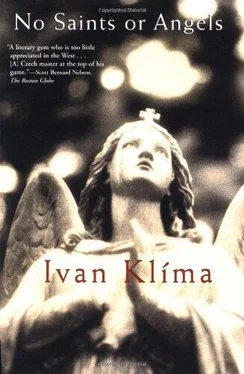5
According to my horoscope, Pluto is crossing the Sun — a fatal aspect that foretells a major upheaval in my life. It looks as if my work for the Institute is heading in that direction. That's unless the upheaval concerns my private life. Most likely it concerns my entire life.
There are too many people who feel threatened by the things I uncover. I'm not trying to say I'm particularly important. Thousands of others could do the work I've been doing. Anyone who took this work seriously and tried to discover the truth of what happened, instead of covering up the tracks, would be considered a threat. The previous director, who tried to prevent others blocking our work, was given the boot, with all honours. Now it's our turn and there won't be any honours.
On several occasions I have noticed that I was being tailed; mostly after I'd arranged a meeting with someone who could
supply interesting information. It was impossible to say whether I was being tailed by the former operatives or the present ones. Maybe it was the present ones after consulting the former ones.
They never stopped me. If I happened to have a rendezvous in a pub or a café they'd try to sit as close as possible to me. I made their work harder by choosing a place where all the adjacent tables were full. I don't know what listening equipment they used, but four years of reading about their activity has taught me that if they are determined to listen in to what I say, I'd have a hard job eluding them.
Nobody says anything to my face. Sometimes I get worried that I'm becoming paranoid.
The people whose reports I study are either dead or act as if they had nothing to do with that activity. And when they admit it, they insist that they never harmed anyone. And what about those for whom the reports were written? They've disappeared; the waters have closed over them; they have all been spirited away to some unknown destination. But occasionally a miracle occurs and the waters open once more — as happened just a few days ago. Ondřej came to ask me whether I'd ever come across a Captain Hádek in the files.
Ondřej is my immediate superior, but we're friends more than colleagues. We share a number of interests. We both like games. Ondřej is great at computer games and he's an excellent chess player, so we nicknamed him Alekhine. He's never kept snakes, but he has two tortoises at home. Maybe he's more of a realist than me. He scoffs at my belief in horoscopes. In his opinion, what can't be proved doesn't exist — that's probably the best approach in our line of work.
I couldn't recall any Hádek. In what connection might his name have arisen?
He explained that this man had been in charge of interrogating a number of Scout leaders, maybe even my dad. My friend and superior had managed to discover from one witness that the
captain — who was apparently promoted to Major afterwards — is still alive. His real name is Rukavička.
That name seized my attention. The first two letters made me think of the guy called Rubáš who dealt with Dad.
'He's really still alive?'
'He lives in some retirement home just outside Prague.' Ondřej shows me the place on the map that hangs on the wall of our office. Naturally the former interrogator is very old now — over eighty.
But Dad's interrogator operated under a different name.
That was possible, of course, Ondřej said. The files from Dad's trial have all disappeared. Ondřej told me he'd try to question Rukavička — Hádek as soon as possible. I could attend too, if I liked.
That reminder of Dad's fate provoked my return to a project I'd previously put to one side. About a month before, I'd been invited to a seminar in Brno, where they wanted me to talk about the beginnings of Communist terror in this country The seminar was to be attended by several well-known historians, as well as some politicians, so it would be an opportunity for me to say something about our work and voice my own opinions. At the same time I feared I wouldn't pass muster. That was why I hadn't written a single line so far.
So that very day I got down to it and continued writing my contribution every evening for the rest of that week.
I wanted to talk in more general terms, not simply to report on what emerged from my daily study of the files.
In the twentieth century, unlike in the previous one, so many people were murdered behind the front lines that you'd think mankind must have suddenly gone berserk. But the innocent have always been murdered. According to the Bible story, the Israelites slew the inhabitants of Ai in the field and in the wilderness to which they had pursued them. 'For Joshua did not draw back the hand that held out his javelin until he had destroyed all who lived in Ai,' it says in the book of the same name.
That's how things were and still are. Unlike animals, people think and feel, so they are aware of their victims' anxiety when they kill them. They are aware of their own desire to live and preserve their stock, and they can guess that those they kill have the same desires. In order to kill without remorse or fellow feeling but instead with a sense of a job well done, it is necessary to regard the victim as one of the damned, a lesser being, or as a lethal and treacherous foe. By destroying him and his descendants, the killers are serving the rest of mankind and protecting the faith or the great goals they espouse.
Why was it in the twentieth century that theories emerged about the damned that had to be wiped out in their millions and why did they receive massive support?
An explanation can be found in moral decay, or rather the decline of religion. During the almost two millennia that Christianity exercised a spiritual influence there was much cruelty of course. At the time of its supreme power, the Church demanded total obedience and discipline and cruelly punished apostasy, but gradually it established limits. The trouble is that in the twentieth century Christianity responded to the questions people were asking with diffidence or perplexity, and that must inevitably have affected their faith. They either lost it or it assumed nightmarish forms that had little in common with the original belief in Jesus as the Son of God, the Messiah. And the belief in a miracle that happened, or in a God who was concerned for the world, gradually dissipated.
But the majority of people needed to believe. They wanted saints to revere. They needed a God and rituals. The time was therefore ripe for latter-day, barbaric pagan religions which the great nonreligious movements started to revive. The Nazis and the Communists alike presented their leaders as gods, whose images must be present at every celebration, of which they invented untold numbers. Party congresses, secular holidays, anniversaries of their own victories, elections and even show trials with death
sentences were all transformed into ritual celebrations intended to fire the emotions of the faithful and stun and numb their reason.
These new faiths also demanded obedience and discipline, but they were devoid of mercy and did not establish any inviolable limits. They revived human sacrifice in proportions without precedent in human history.
Of course it would be possible to find economic and historical reasons for what happened. Consternation at the massacres of the First World War, anxiety due to the uncertainties associated with the industrial epoch, a longing for a better organization of society. Nevertheless, for people to become an enormous, unthinking and obedient mass ready to do anything their leaders ordered, it needed a boundless belief in something that seemed superhuman and redemptive. Its prophets knew that every new belief needs to define itself in terms of those who reject it, who are then declared damned. It was necessary to kill kulaks, Jews or counter-revolutionaries, shoot priests, behead kings, poison infants and execute more and more victims in order to validate the new religions.
Читать дальше












